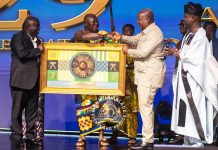By Professor Douglas Boateng
- They called him Daddy, yet he fathered not only melodies but memories. Kojo Fosu, the man the world lovingly knows as Daddy Lumba, was more than a musician; he was the heartbeat of Ghanaian highlife, the voice of a generation and the lyrical philosopher who turned everyday conversations into extraordinary art.
- His voice, smooth as silk dipped in honey, seduced the ears, healed broken hearts, and provoked deep reflection on life’s complex journey.
- He came, and when the platform was handed to him, he embraced it fully. He performed with unmatched passion, turning every stage into a cathedral of sound and soul.
- From ‘Theresa’ to ‘Aben Wɔ Ha’, he turned whispers of the streets into anthems of truth, making even the guilty tap their feet with hidden delight.
- A proverb says “When a tree bears fruit, the stones aim higher.” And like the mahogany tree, Lumba stood tall and unyielding, admired for his strength, resilience and timeless beauty.
- Despite criticism and envy, his melodies endured, transforming highlife into a universal language that crossed borders, generations, and social classes.
- Though the mortal stage dims, his music will live on and be listened to by generations of Africans yet unborn. And in death, his genius will be appreciated even more, for history often treasures what it can no longer touch.
- Daddy Lumba reminded us that music is not just entertainment; it is rebellion, reflection, redemption, and hope wrapped in rhythm. True art never dies; it simply changes its stage.
- Daddy Lumba is gone, but his voice remains immortal, echoing through time like a guiding melody in Africa’s restless night.









